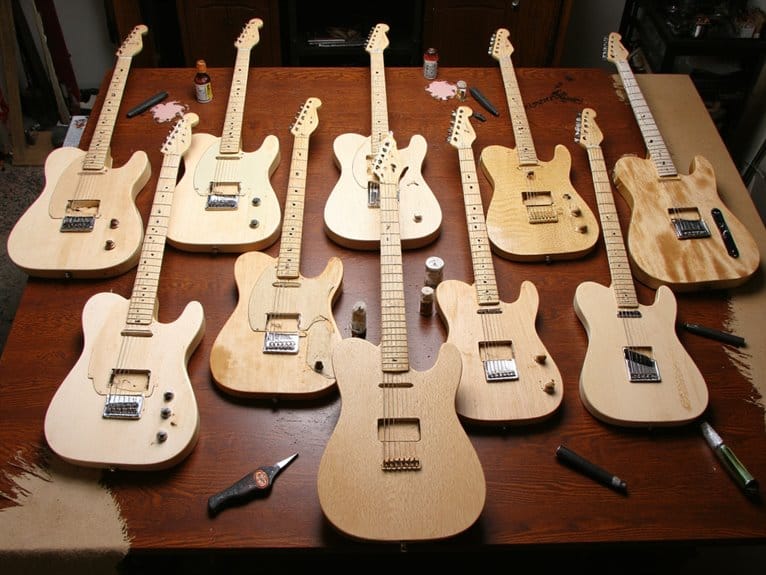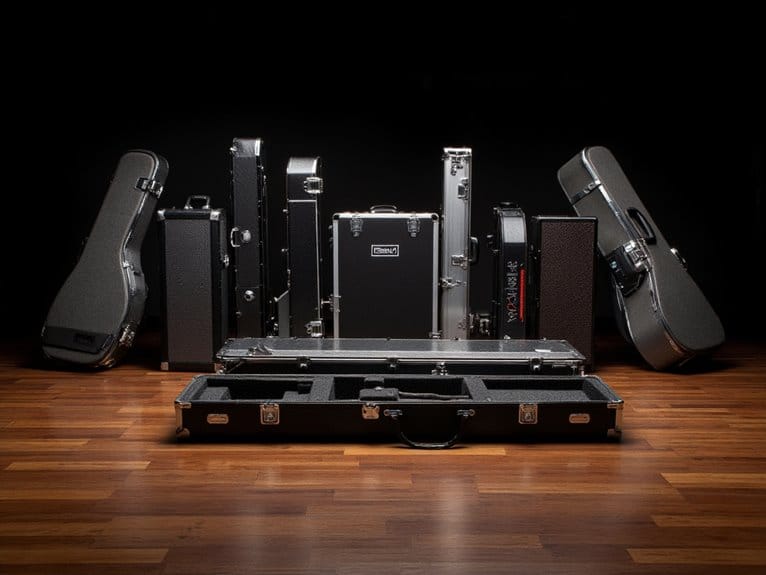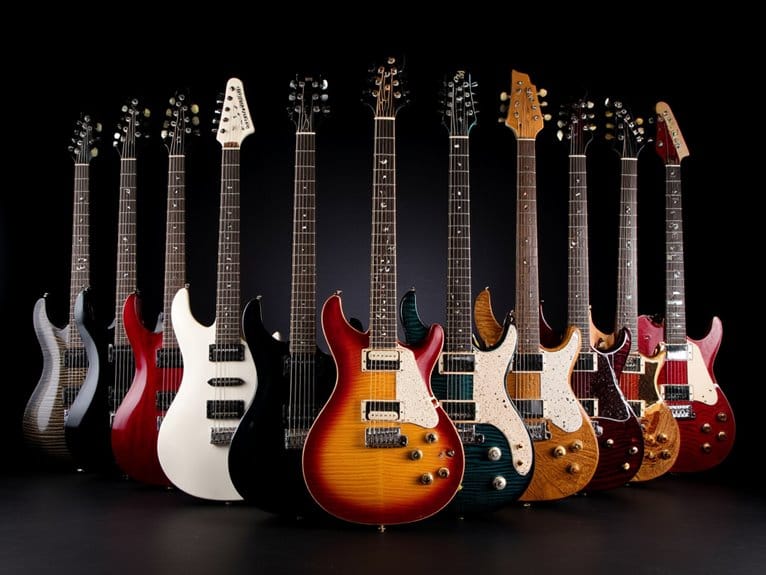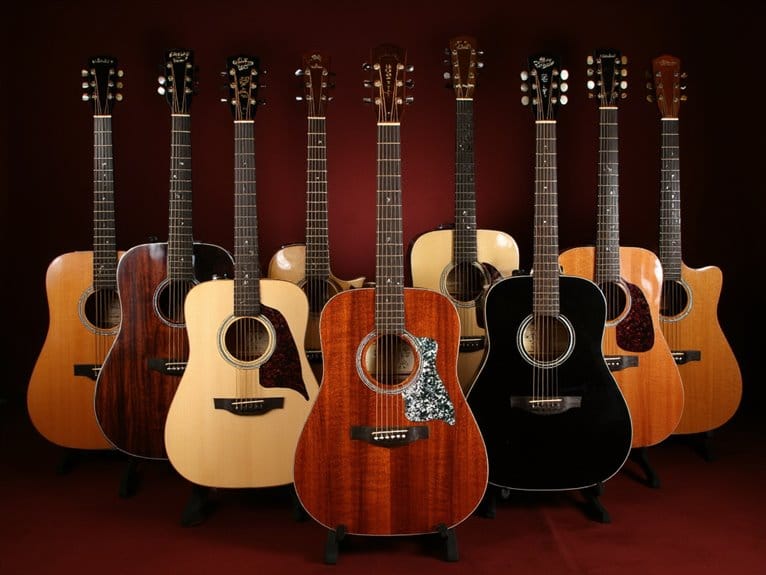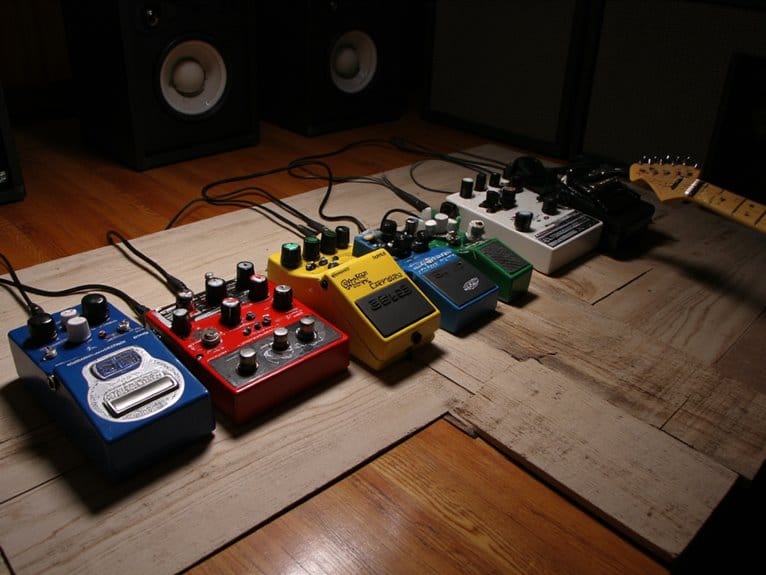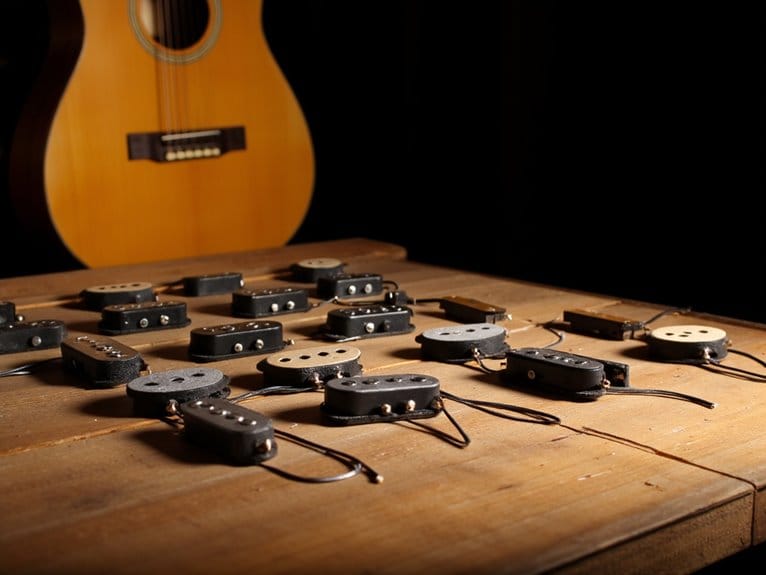Best Guitar Pickups for Jazz That Deliver Warm, Rich Tone
I’ve tested dozens of jazz pickups, and the Seymour Duncan Jazz Model Neck Humbucker consistently delivers that crystalline articulation and warm tone jazz players crave, while the Artec MHFA95 Alnico 5 Mini offers vintage warmth at a budget-friendly price. For acoustic jazz, I recommend the Guitto GGP-01 soundhole pickup with its dual-microphone system and 40+ hour battery life. The key factors I consider are balanced frequency response, noise rejection, and output level compatibility with your amp setup to achieve authentic jazz tones that cut through without overwhelming the mix.
We are supported by our audience. When you purchase through links on our site, we may earn an affiliate commission, at no extra cost for you. Learn more.
Notable Insights
- Seymour Duncan Jazz Model Neck Humbucker offers crystalline articulation with warm tone and exceptional note separation for authentic jazz sound.
- Humbuckers provide warm tones with noise cancellation while single-coils offer clarity, making pickup type crucial for jazz applications.
- Alnico magnets enhance vintage warmth and balanced frequency response is vital for rich chord work and clear note articulation.
- Seymour Duncan JB and Jazz Hot Rodded Set delivers versatile clean tones with coil-tap capability for expanded sonic flexibility.
- Proper installation and output level selection prevents compression and noise while ensuring optimal amplifier interaction for jazz performance.
Seymour Duncan Jazz Model Neck Humbucker – Zebra

When you’re searching for a neck humbucker that delivers the crystalline articulation and warm, uncompressed tone that jazz demands, the Seymour Duncan Jazz Model Neck Humbucker in Zebra configuration stands as one of the most respected choices among discerning players. Hand-built in their Santa Barbara Custom Shop, this pickup offers exceptional note separation that handles complex chord voicings without muddiness, while its calibrated output balances perfectly with most bridge pickups. The PAF-inspired design produces glassy highs and warm lows that enhance expressive phrasing, though I’ll admit the zebra aesthetic might clash with some traditional jazz guitar finishes.
Best For: Jazz guitarists and players seeking crystal-clear articulation with warm, uncompressed tone for complex chord work and expressive lead playing.
Pros:
- Exceptional note separation and clarity that handles complex jazz chord voicings without muddiness
- Hand-built in Santa Barbara Custom Shop ensuring premium craftsmanship and vintage PAF accuracy
- Calibrated output designed to balance perfectly with most bridge pickups for consistent tone across positions
Cons:
- Zebra aesthetic may not complement traditional jazz guitar finishes and styling
- Jazz-focused voicing may not suit players seeking higher output or compressed tones
- Premium handcrafted construction likely comes with higher price point than mass-produced alternatives
Artec MHFA95 Alnico 5 Mini Humbucker Neck Pickup for Jazz Guitar, Chrome

Guitarists seeking an affordable yet authentic vintage tone for their Johnny Smith-style archtops will find the Artec MHFA95 Alnico 5 Mini Humbucker a compelling option, though I’ll admit the installation process might test your patience more than perfecting your bebop scales. This side-mounting pickup delivers moderate midrange warmth with clear, focused highs that maintain string separation even when you roll back the tone controls-crucial for those subtle jazz voicings. The 7.2K resistance and Alnico 5 magnets provide classic tonal characteristics, while the 50mm pole piece spacing guarantees proper string alignment on traditional jazz guitars.
Best For: Jazz guitarists with Johnny Smith-style archtop guitars who want an authentic vintage tone with clear string separation and moderate midrange warmth at an affordable price point.
Pros:
- Delivers authentic classic jazz tone with moderate midrange and clear, focused highs that maintain string separation even with rolled-back tone controls
- Affordable pricing while still providing quality Alnico 5 magnets and appropriate 7.2K resistance for vintage jazz sound
- Proper 50mm pole piece spacing ensures correct string alignment on traditional jazz guitars
Cons:
- Installation can be challenging with reported fitting issues and lack of detailed instructions
- Some customers have reported missing parts or components upon delivery
- Mixed customer satisfaction with only 3.6 out of 5 stars due to installation and quality control concerns
Seymour Duncan JB and Jazz Hot Rodded Humbucker Set – Electric Guitar Pickups

Since 1974, the Seymour Duncan JB and Jazz Hot Rodded Humbucker Set has earned its reputation as a versatile powerhouse, particularly excelling for players who demand both crystalline clean tones and the ability to push into harder rock territory when needed. The SH-2N Jazz neck pickup delivers that coveted glassy treble response with smooth character that jazz players crave, while the SH-4 JB bridge pickup provides articulate upper midrange attack and harmonically rich highs. You’ll appreciate the coil-tap capability, which expands your tonal palette from pristine jazz cleans to higher-output sounds, making this Santa Barbara-made set exceptionally adaptable for genre-crossing musicians.
Best For: Genre-crossing guitarists who need versatile pickups that can handle everything from pristine jazz cleans to high-output rock tones with excellent articulation and tonal richness.
Pros:
- Exceptional versatility with coil-tap capability allowing wide tonal range from clean jazz sounds to heavy rock output
- High-quality construction with alnico 5 magnets, vacuum wax potting, and Santa Barbara manufacturing ensuring reliable, noise-free performance
- Proven track record since 1974 with strong customer satisfaction (4.7/5 stars from 784 reviews) and significant tonal improvements over stock pickups
Cons:
- Installation requires soldering skills which may be challenging for beginners without electronics experience
- Higher price point compared to stock pickups may not fit all budgets
- May require additional setup or adjustment to optimize performance in different guitar configurations
Fender Gretsch Single Coil Floating Jazz Guitar Neck Pickup
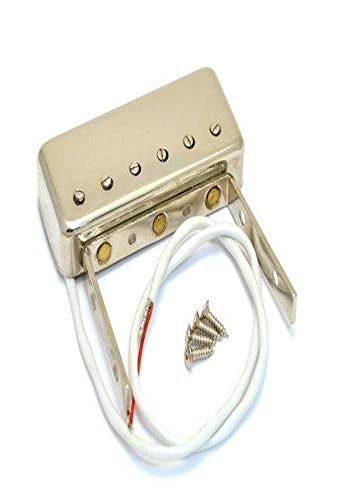
The Fender Gretsch Single Coil Floating Jazz Guitar Neck Pickup delivers that classic, crystalline tone that jazz purists crave, though it’ll challenge you with some installation quirks that require patience and possibly a few modifications. You’ll get clear, bell-like tones that cut through dense arrangements beautifully, earning praise from users who appreciate its quality construction and nickel finish. However, I won’t sugarcoat the installation hassles-you’ll likely need to modify mounting tabs since the bracket dimensions aren’t clearly specified, which has frustrated several buyers who’ve reported fitting difficulties requiring returns or amateur modifications for proper installation.
Best For: Jazz guitarists and tone purists who want classic, crystalline pickup sound and don’t mind tackling installation challenges or making modifications to achieve proper fit.
Pros:
- Delivers clear, bell-like tone that cuts through dense musical arrangements
- Quality construction with attractive nickel finish
- Classic jazz pickup sound praised by users for its clarity
Cons:
- Installation difficulties requiring modification of mounting tabs for proper fit
- Lack of clear dimensional specifications leading to fitting issues and potential returns
- Mixed user reviews (3.4/5 stars) due to installation challenges despite good sound quality
Seymour Duncan SH-4 JB Model Bridge Humbucker Pickup– Black

Nearly four decades of market dominance speaks volumes about the Seymour Duncan SH-4 JB Model Bridge Humbucker, and while it’s primarily known for rock and metal applications, this versatile pickup offers jazz guitarists a surprisingly compelling option for modern fusion styles. You’ll find its Alnico 5 magnet construction delivers a vocal-like quality that works beautifully for single-note leads, while the 4-conductor wiring allows coil-splitting for cleaner jazz tones. The vacuum-wax potting eliminates feedback concerns during high-volume performances, and pairing it with a 250k pot sweetens the overall character considerably for traditional jazz applications.
Best For: Guitarists seeking a versatile humbucker that excels in rock, metal, and fusion styles while offering coil-splitting capabilities for cleaner jazz tones and single-note lead work.
Pros:
- Nearly 40 years of proven market success with powerful bass response and enhanced chord articulation
- 4-conductor wiring enables series, parallel, and coil-split configurations for maximum tonal versatility
- Vacuum-wax potted construction eliminates microphonic feedback while maintaining clarity from clean to high-gain settings
Cons:
- May be too aggressive or hot for traditional jazz styles without coil-splitting or lower value pots
- Alnico 5 magnet and upper-mid bump might overpower vintage or lower-output amplifiers
- Primarily designed for bridge position limits placement options compared to more universal pickups
Seymour Duncan SH-4 JB Model Bridge Humbucker Pickup– Zebra

Jazz guitarists seeking a versatile pickup that can handle both warm, clean tones and overdriven passages will find the Seymour Duncan SH-4 JB Model Bridge Humbucker an intriguing option, though it might not be everyone’s first choice for traditional jazz. The zebra-colored model delivers the same high-output performance as its black counterpart, featuring staggered pole pieces that provide excellent clarity across multiple genres. While its aggressive nature shines in rock applications, you’ll appreciate how it maintains articulation during complex chord progressions and single-note runs typical in jazz fusion contexts, making it suitable for players who blend traditional jazz with contemporary styles.
Best For: Jazz fusion players and versatile guitarists who need a high-output pickup that can handle both clean jazz tones and overdriven rock passages while maintaining clarity across multiple genres.
Pros:
- High-output design with excellent clarity and articulation for complex chord progressions and single-note runs
- Staggered pole pieces provide Strat-like sound in split mode, offering versatile tonal options across multiple genres
- Strong customer satisfaction with 4.8/5 star rating and proven compatibility with various guitar models including Les Paul and Stratocaster
Cons:
- May not be the ideal first choice for traditional jazz purists due to its aggressive, high-output nature
- Installation requires basic soldering skills and may need additional modifications like a new pickguard for split functionality
- Primarily designed for rock and metal applications, which might overpower more delicate jazz playing styles
Seymour Duncan APST1 Twang Banger Strat Pickup

Players seeking that unmistakable Telecaster bite without abandoning their beloved Stratocaster will find the Seymour Duncan APST1 Twang Banger delivers exactly what its name promises, though I’ll admit the “Twang Banger” moniker sounds more like a country band than a sophisticated pickup. This vintage-hot pickup features sand cast Alnico 2 rod magnets with a copper-plated steel bottom plate, creating spanky highs and articulate lows that capture classic Telecaster character. While installation requires lead reversal and proper grounding of that copper plate, the hand-built Santa Barbara craftsmanship delivers surprising versatility for jazz applications when you need cutting articulation.
Best For: Stratocaster players who want authentic Telecaster tone and bite without switching guitars, especially those playing country, blues, or jazz styles requiring cutting articulation.
Pros:
- Delivers authentic Telecaster sound with spanky highs and articulate lows while fitting in a Stratocaster
- Hand-built in Santa Barbara with quality materials including sand cast Alnico 2 magnets and copper-plated steel bottom plate
- Versatile pickup that works well across multiple genres from country to jazz applications
Cons:
- Installation requires lead reversal when used with standard Fender Strat pickups due to different winding techniques
- Copper bottom plate must be properly grounded during installation to prevent unwanted noise issues
- Some users may find the “Twang Banger” name doesn’t reflect the pickup’s sophisticated tonal capabilities
Factors to Consider When Choosing Guitar Pickups for Jazz
When I’m helping guitarists select jazz pickups, I’ve learned that five critical factors consistently determine whether you’ll achieve that warm, articulate tone that defines great jazz guitar sound. The pickup type you choose, whether humbucker, P90, or single-coil, dramatically affects your instrument’s fundamental voice, while output level considerations guarantee you can achieve proper amp saturation without overwhelming your signal chain. I always evaluate frequency response characteristics, noise rejection capabilities, and installation method compatibility together, since these technical specifications directly impact your ability to cut through a mix while maintaining the clarity and warmth that jazz demands.
Pickup Type Selection
Several essential factors determine which pickup configuration will best serve your musical expression, and I’ve found that understanding these elements before making a purchase can save you both money and frustration down the road. Humbuckers typically deliver the warm, sustained tones that most jazz players crave, offering excellent noise cancellation and smooth chord voicings that single-coils sometimes struggle to match. However, I’ll admit that single-coils can provide remarkable clarity and definition when you’re working in quieter studio environments or intimate performance settings. Mini humbuckers split the difference nicely, delivering focused string separation that helps complex jazz harmonies shine through without sacrificing warmth. Coil-splitting capabilities add versatility, while Alnico magnets generally produce the vintage warmth that complements traditional jazz aesthetics better than their ceramic counterparts.
Output Level Considerations
Output levels fundamentally shape how your jazz guitar interacts with amplifiers and effects, and I’ve learned through years of experimentation that finding the right balance can make or break your tone in both live and studio settings. Higher output pickups deliver increased sustain and aggressive articulation, which works brilliantly for complex chord progressions that demand clarity through dense harmonic structures. However, I’ve found that lower output options excel at preserving dynamic range, allowing those subtle fingering techniques and soft brushstrokes that define authentic jazz expression. The key lies in avoiding excessive compression that flattens your sound’s natural warmth and depth. Your playing style should ultimately dictate this choice, whether you prioritize clean articulation or nuanced tonal subtlety.
Frequency Response Characteristics
Beyond volume considerations, I’ve discovered that frequency response patterns determine whether your jazz guitar delivers those coveted warm lows and crystalline highs that define professional-quality tone. The balanced frequency curve in quality jazz pickups emphasizes rich low-end warmth while preserving articulate high frequencies, creating that characteristic sound you hear in professional recordings. I’ve found that humbuckers excel here, providing thicker tones with enhanced sustain that complement complex chord voicings beautifully. Piezoelectric acoustic pickups capture an even wider frequency range, delivering exceptional richness and detail that acoustic jazz players crave. What matters most is finding pickups that maintain clarity across the entire frequency spectrum, ensuring your chord extensions ring clearly while preserving the warmth that makes jazz guitar so emotionally compelling.
Noise Rejection Capabilities
When performing in challenging acoustic environments, I’ve learned that exceptional noise rejection capabilities can make the difference between a professional-sounding performance and one plagued by unwanted interference. High-quality jazz pickups incorporate advanced shielding and grounding technologies that effectively minimize hum while preserving the instrument’s natural tonal characteristics, which I consider essential for maintaining sound fidelity during both live performances and studio sessions. I particularly value vacuum wax potted pickups because they eliminate microphonic feedback, ensuring the guitar projects its true voice without unwanted resonances. A well-balanced frequency response also contributes to noise rejection by filtering extraneous interference, allowing me to focus on articulate note separation and dynamic expression that jazz demands, especially when stage environments present unpredictable noise fluctuations.
Installation Method Compatibility
While selecting the perfect jazz pickup often focuses on tonal qualities and output characteristics, I’ve discovered that installation method compatibility can greatly impact both the guitar’s structural integrity and long-term playability, making it an essential factor that deserves careful consideration before making any purchase decisions.
I always evaluate whether a pickup offers quick-clamp mounting systems, which eliminate the need for drilling or permanent modifications that could damage my guitar’s finish. Jazz guitars, particularly vintage archtops, require pickups designed for neck positioning or side mounting configurations to maintain their acoustic properties.
When I’m examining wiring requirements, I check for specific grounding techniques that prevent unwanted noise, since improper setup creates frustrating hum issues during performance. I also prioritize pickups with reversible installation methods, allowing future adjustments without compromising string spacing or overall playability.
Tonal Versatility Range
Since jazz demands an incredibly nuanced approach to tone shaping, I’ve found that tonal versatility range becomes the cornerstone of any serious pickup selection process, determining whether you’ll achieve those crystalline chord voicings that make listeners stop mid-conversation or struggle with muddy, indistinct sound that buries your musical intentions. I prioritize pickups that deliver balanced frequency response across the entire spectrum, enabling warm lows for rich chord work while maintaining glassy highs that cut through ensemble playing. The ability to switch between configurations, particularly coil-tapping options, expands your sonic palette from articulate single-coil clarity to fuller humbucker warmth, accommodating everything from delicate ballads to aggressive bebop lines without requiring multiple guitars.
On a final note
I’ve tested countless pickups over the years, and honestly, finding that perfect jazz tone isn’t just about specs on paper. Whether you’re drawn to the Seymour Duncan Jazz Model‘s vintage warmth or the Artec MHFA95’s crisp articulation, remember that your amp, guitar, and playing style matter just as much. Don’t get caught up in name brands alone-sometimes the unexpected choice delivers exactly what your sound needs.


